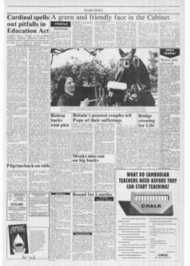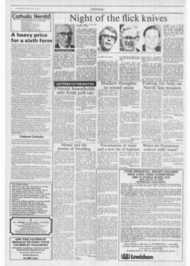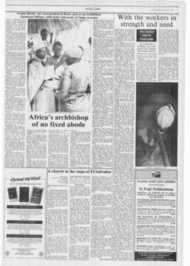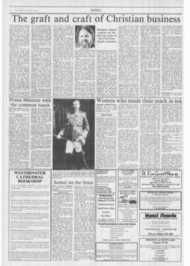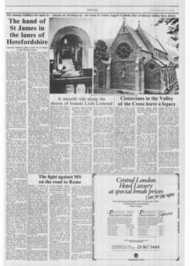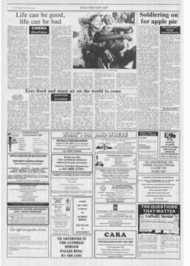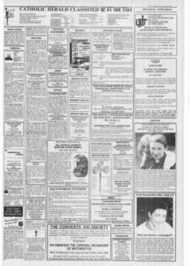Page 6, 28th July 1989
Page 6
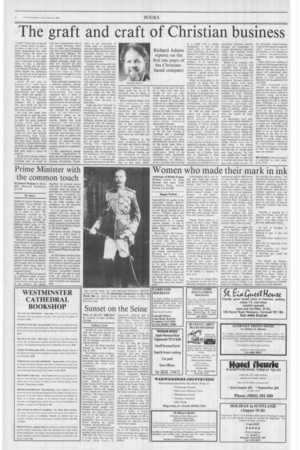
Report an error
Noticed an error on this page?If you've noticed an error in this article please click here to report it.
Tags
Share
Related articles
Chad Varaii, Founder Of The Samaritans : The True Wilderness
Paperback Round-up
Paperback Round-up Storm: New Writing From Mexico Edited...
Opportunity Knocks In Poets' Corner
Pat Jones Talking
Women who made their mark in ink
Maggie Parham Anthology of British Women Writers edited by Dale. Spender and Janet Todd" (Pandora Press, Unwin Hyman Ltd £25.00)
Impressed by the quality of the playwright Joanna Baillie's tragedies, but nettled at the same time that a woman should write so well, Byron attacked her as follows: "Voltaire, asked why no woman had written even a tolerable tragedy, replied 'the composition of a tragedy requires testicles. If this be true, Lord knows what Joanna Baillie does I suppose she borrows them."
Byron does not, like Voltaire, believe that women are intrinsically less able than men to write well. He simply presents a tradition that women's literature has received neither due acknowledgement nor proper encouragement. Women have, in Lady Winchelsea's words, been "Debarred from all improvements of the mind and to be dull expected and designed." The primary aim of this anthology is to redress the balance; to show the range and richness of women's work on the one hand, and on the other to show that women have been "Education more than nature's fools." Unfortunately this is not its only aim. Todd and Spender look also to "identify recurring themes and to trace the evolutionary and interconnecting patterns in British womens' writing." And because so they claim women's autonomy and literary legitimacy has been a predominant theme in women's writing, they seek to give this theme predominance in their anthology. By widening their brief thus, they actually detract from their primary purpose.
Virginia Woolf asked in A Room of One's Own, "What had George Eliot in common with Emily Bronte? Did not Charlotte Bronte fail entirely to understand Jane Austen? Save for the possibly relevant fact that not one of them had a child, four more incongruous characters could not have met together in a room." British women writers do not form a cohesive, self-conscious whole, and Todd and Spender have had to distort things to make them seem one. Feminism has sometimes been given more weight than literary merit, and authoresses have often not been fairly represented either in terms of the quality or quantity of their work.
The novels of George Eliot, for example, are left out of the anthology altogether, and she is
represented only by Silly Novels by Lady Novelists an essay she wrote for the Westminster Review. Eliza Linton is given considerably more space than either Jane Austen or Charlotte Brontë. So is Cicely Hamilton. Sixteen pages arc given to an extract from her play How the Vote Was Won fascinating on suffragettes, but hardly a great literary achievement. The editors introduce their anthology by saying that womens' literature has been unfairly excluded, but then fill it with examples which leave one wondering whether this exclusion hasn't been in order.
Nevertheless, one cannot but end by agreeing with what Maria Edgeworth wrote in 1795 that "instead of being ashamed that so little has been hitherto been done by female abilities, in science and in useful literature, I am surprised that so much has been affected. Till of late, women were kept in Turkish ignorance: every means of acquiring knowledge was discountenanced by fashion." One thing that this anthology does very well is to show how women writers triumphed against the attitude that, as Mary Hays wrote in the mideighteenth century, "the highest pitch of virtue to which a woman can possibly aspire in the present system of things is to please her husband in whatever line pleasing him consists." We find Eliza Haywood in the early eighteenth century leaving her husband, supporting herself by writing and establishing the Female Spectator whilst Frances Trollope supported seven and Charlotte Smith ten children by writing. And the feminists of previous centuries show far more wit and sense of humour about their situation than those of today.
"Woman, a pleasing but a short-lived flower, too soft for business and too weak for pow'r," wrote Mary Leapor in the early eighteenth century.
"A wife in bondage, or neglected maid Despised if ugly; if she's fair betrayed. 'Tis wealth alone inspires every grace And calls the rapturous to her plenteous face. What numbers for those charming features pine, If blooming arcs round her temples twine!"
One should not imagine, however, that brilliant women went entirely without praise. We find Johnson tickled pink to be seated next to the author of Evelilna at dinner "sitting by Miss Burney makes me very proud today!" and Ann Radcliffe's Mysteries of Udopho found many male admirers.
blog comments powered by Disqus




